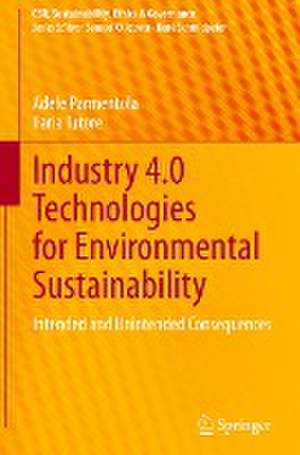Industry 4.0 Technologies for Environmental Sustainability: Intended and Unintended Consequences: CSR, Sustainability, Ethics & Governance
Autor Adele Parmentola, Ilaria Tutoreen Limba Engleză Hardback – noi 2023
The book is of interest to researchers from various disciplines who approach Industry 4.0 technologies from a business perspective, and on the other hand to managers and strategic consultants who want to promote sustainable change in their companies.
Din seria CSR, Sustainability, Ethics & Governance
-
 Preț: 400.75 lei
Preț: 400.75 lei - 20%
 Preț: 879.88 lei
Preț: 879.88 lei - 18%
 Preț: 897.65 lei
Preț: 897.65 lei - 18%
 Preț: 1002.13 lei
Preț: 1002.13 lei - 18%
 Preț: 1013.02 lei
Preț: 1013.02 lei - 15%
 Preț: 645.28 lei
Preț: 645.28 lei - 20%
 Preț: 690.12 lei
Preț: 690.12 lei - 15%
 Preț: 646.62 lei
Preț: 646.62 lei - 15%
 Preț: 505.30 lei
Preț: 505.30 lei - 15%
 Preț: 647.40 lei
Preț: 647.40 lei - 24%
 Preț: 700.88 lei
Preț: 700.88 lei -
 Preț: 366.69 lei
Preț: 366.69 lei -
 Preț: 412.06 lei
Preț: 412.06 lei - 19%
 Preț: 549.68 lei
Preț: 549.68 lei - 20%
 Preț: 567.86 lei
Preț: 567.86 lei - 20%
 Preț: 575.49 lei
Preț: 575.49 lei - 24%
 Preț: 750.45 lei
Preț: 750.45 lei - 24%
 Preț: 823.00 lei
Preț: 823.00 lei - 18%
 Preț: 1003.70 lei
Preț: 1003.70 lei - 24%
 Preț: 692.28 lei
Preț: 692.28 lei - 20%
 Preț: 567.86 lei
Preț: 567.86 lei -
 Preț: 377.77 lei
Preț: 377.77 lei - 19%
 Preț: 472.32 lei
Preț: 472.32 lei -
 Preț: 367.40 lei
Preț: 367.40 lei - 20%
 Preț: 576.30 lei
Preț: 576.30 lei - 20%
 Preț: 587.28 lei
Preț: 587.28 lei - 20%
 Preț: 565.08 lei
Preț: 565.08 lei - 20%
 Preț: 565.89 lei
Preț: 565.89 lei - 20%
 Preț: 568.19 lei
Preț: 568.19 lei - 24%
 Preț: 822.45 lei
Preț: 822.45 lei - 20%
 Preț: 558.87 lei
Preț: 558.87 lei - 24%
 Preț: 1160.84 lei
Preț: 1160.84 lei - 24%
 Preț: 792.83 lei
Preț: 792.83 lei - 20%
 Preț: 573.76 lei
Preț: 573.76 lei - 24%
 Preț: 583.99 lei
Preț: 583.99 lei -
 Preț: 375.76 lei
Preț: 375.76 lei - 24%
 Preț: 688.02 lei
Preț: 688.02 lei -
 Preț: 388.13 lei
Preț: 388.13 lei - 24%
 Preț: 744.57 lei
Preț: 744.57 lei - 20%
 Preț: 593.48 lei
Preț: 593.48 lei - 20%
 Preț: 573.76 lei
Preț: 573.76 lei - 19%
 Preț: 437.63 lei
Preț: 437.63 lei -
 Preț: 365.93 lei
Preț: 365.93 lei -
 Preț: 353.51 lei
Preț: 353.51 lei -
 Preț: 366.69 lei
Preț: 366.69 lei
Preț: 722.75 lei
Preț vechi: 881.40 lei
-18% Nou
Puncte Express: 1084
Preț estimativ în valută:
138.29€ • 144.78$ • 114.43£
138.29€ • 144.78$ • 114.43£
Carte tipărită la comandă
Livrare economică 05-19 aprilie
Preluare comenzi: 021 569.72.76
Specificații
ISBN-13: 9783031400094
ISBN-10: 3031400097
Ilustrații: VIII, 78 p. 25 illus., 19 illus. in color.
Dimensiuni: 155 x 235 mm
Greutate: 0.3 kg
Ediția:1st ed. 2023
Editura: Springer International Publishing
Colecția Springer
Seria CSR, Sustainability, Ethics & Governance
Locul publicării:Cham, Switzerland
ISBN-10: 3031400097
Ilustrații: VIII, 78 p. 25 illus., 19 illus. in color.
Dimensiuni: 155 x 235 mm
Greutate: 0.3 kg
Ediția:1st ed. 2023
Editura: Springer International Publishing
Colecția Springer
Seria CSR, Sustainability, Ethics & Governance
Locul publicării:Cham, Switzerland
Cuprins
Environmental Sustainability and Firms’ Competitive Advantage.- Fourth Industrial Revolution and Firms’ Digitalization.- Technologies Adoption and the Environmental Sustainability.- Unveiling the Positive and Negative Effects of Blockchain Technologies on Environmental Sustainability in Practice
Notă biografică
Adele Parmentola is Full Professor at the Department of Management and Quantitative Studies of Parthenope University of Naples (Italy), where she teaches business management, marketing, innovation management and international innovation network. She is the author of more than 80 publications on the topics of innovation management, Industry 4.0 and environmental sustainability, university entrepreneurship and local innovation systems. Her studies are published in journals like Technovation, Small Business Economics, R&D Management, Business Strategy and the Environment and Journal of Technology Transfer.
Ilaria Tutore is an Associate Professor of Management at the Department of Management and Quantitative Studies of Parthenope University of Naples (Italy). She has been Visiting PhD student at Aarhus School of Business (Denmark), studying at 'CORE' research center for the environmental strategy of Danish power companies. Her research interests cover the field of organizations and the natural environment, diffusion of innovation, and green innovation. Her studies are published in journals like Business Strategy and the Environment, Technology Analysis & Strategic Management and Management Decision.
Textul de pe ultima copertă
Industry 4.0 technologies are expected to have a positive impact on the global economy by promoting autonomous interoperability, agility, flexibility, decision-making, efficiency or cost reduction, which are also expected to be resource efficient. However, new and emerging technologies can also have potentially harmful social and environmental impacts that must be considered.
The goal of this book is to provide a deeper understanding of how Industry 4.0 technologies can benefit or harm the environmental sustainability of companies. To this end, it presents a classification of Industry 4.0 technologies and evaluates for each typology the positive and negative aspects of their implementation. Thus, the book considers Industry 4.0 technology and environmental sustainability from the perspective of management on the one hand and from the perspective of technology users on the other.
The book is of interest to researchers from various disciplines who approach Industry 4.0 technologies from a business perspective, and on the other hand to managers and strategic consultants who want to promote sustainable change in their companies.
The book is of interest to researchers from various disciplines who approach Industry 4.0 technologies from a business perspective, and on the other hand to managers and strategic consultants who want to promote sustainable change in their companies.
Caracteristici
Provides a taxonomy of Industry 4.0 technologies Outlines the challenges of implementing new technologies Helps managers to assess positive and environmental effects of digitalization
